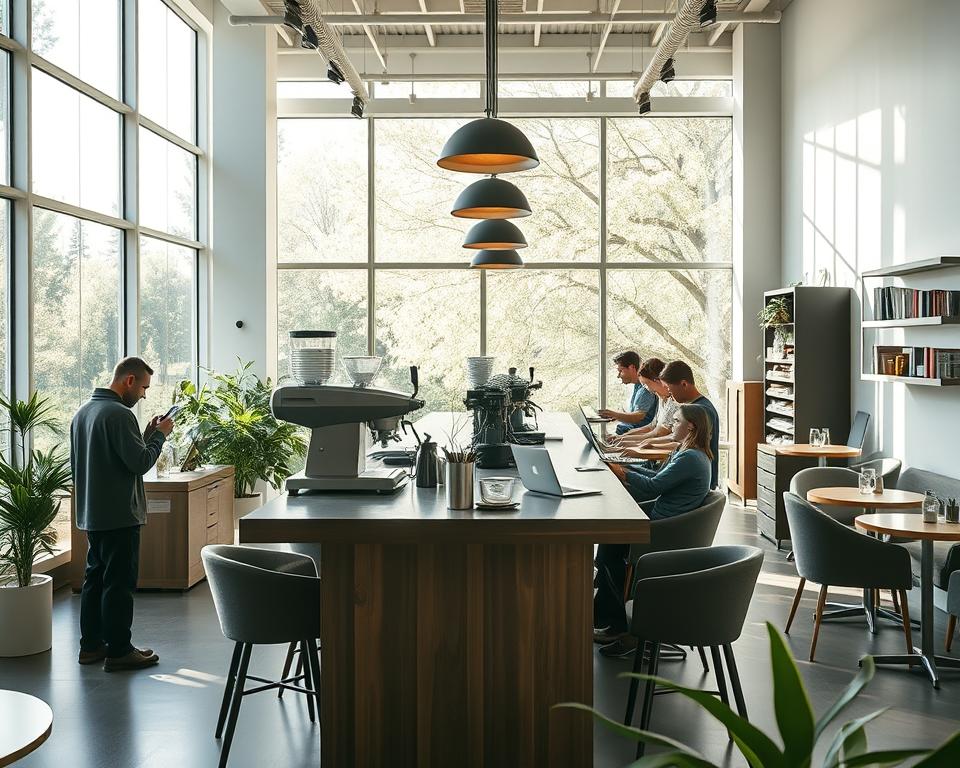The third-wave coffee model has revolutionized the specialty coffee industry. It emphasizes quality, sustainability, and the coffee experience. This shift has increased demand for premium coffee beans, opening new opportunities for artisanal coffee shops. In the United States, the specialty coffee market is booming, with India ranking as the 10th fastest-growing market.
Third Wave Coffee has grown from a single cafe to over 90 locations across 6 cities. They plan to open over 300 new franchised locations this year. Their success stems from focusing on high-quality coffee production and consumption. Unlike traditional models, they prioritize quality over quantity. They source premium coffee beans directly from farmers, ensuring ethical practices and fair wages.
The third-wave coffee model is about more than just serving coffee. It’s about creating a unique and memorable experience. Artisanal coffee shops lead this movement, offering specialty coffee drinks and a welcoming environment. As the industry evolves, companies focus on quality, sustainability, and customer experience to stay competitive.
Introduction to the Third-Wave Coffee Business Model
The third-wave coffee model offers a unique approach to promoting and selling specialty coffee. It focuses on quality, sustainability, and the coffee experience. This has led to the growth of artisanal coffee shops and new distribution channels like online sales and subscriptions.
Key Takeaways
- The third-wave coffee business model focuses on quality, sustainability, and the overall coffee experience.
- Artisanal coffee shops are at the forefront of the third-wave coffee movement, offering a unique and memorable experience.
- Third Wave Coffee has expanded rapidly, with plans to open over 300 new franchised cafe locations in the current year.
- The company’s emphasis on high-quality coffee production and consumption distinguishes it from traditional coffee models.
- The third-wave coffee business model has created new opportunities for specialty coffee shops to thrive and expand their distribution networks.
- The specialty coffee industry is growing rapidly, with India being the 10th fastest growing market for specialty coffee.
- Third-wave coffee companies often engage in direct trade relationships with farmers, ensuring fair prices and sustainable practices.
Understanding Third-Wave Coffee
Third-wave coffee has transformed our coffee culture. It focuses on sustainable coffee sourcing, direct trade relationships, and small-batch roasting. This movement has raised coffee’s status, making it a premium experience. It has also created a new breed of coffee lovers who cherish the art of coffee-making.
The third-wave coffee movement started in the 1990s. Coffee aficionados then looked for high-quality, unique, and distinctive beans. This search led to the establishment of direct trade relationships between farmers and roasters. Today, third-wave coffee is known for its small-batch roasting. This method allows for precise control over roasting, enhancing the flavor’s complexity.
- High-quality, unique, and distinctive coffee beans
- Sustainable coffee sourcing practices that prioritize environmental and social responsibility
- Direct trade relationships that ensure fair compensation for coffee farmers
- Small-batch roasting methods that allow for greater control over the roasting process
Understanding third-wave coffee’s origins and characteristics helps us value the craftsmanship behind it. It shows the dedication to creating unique and distinctive coffee experiences.
Core Principles of the Third-Wave Coffee Model
The third-wave coffee movement is distinguished by several core principles. It focuses on delivering a premium coffee experience that highlights the distinct qualities of single-origin coffee beans. This philosophy values high-quality beans, often sourced through direct trade, and the story behind each batch.
This emphasis on quality and transparency has fueled the emergence of artisanal coffee shops. These establishments focus on the art of coffee making. They employ expert baristas who educate customers on the subtleties of various coffee types and brewing techniques. By focusing on the unique flavors and production methods of each coffee, these shops offer a unique and engaging experience.
- Direct trade relationships with farmers to ensure fair prices and high-quality beans
- Emphasis on transparency and ethics in coffee production and sourcing
- A focus on showcasing the unique characteristics of single-origin coffee beans
- Expertly trained baristas who can guide customers through the coffee menu
Third-wave coffee shops prioritize quality, transparency, and craftsmanship. This approach has made their experience memorable for customers. It has also propelled the growth of the specialty coffee market, setting a new standard for coffee shops globally.
The Role of Craftsmanship in Third-Wave Coffee
Craftsmanship is crucial in third-wave coffee, enabling artisanal coffee shops to craft unique coffee experiences. This is made possible by small-batch roasting, which allows for precise control over the roasting process. This results in more complex and nuanced flavors. Also, direct trade relationships with coffee farmers ensure the use of high-quality beans, enhancing the coffee’s overall quality.
Key aspects of craftsmanship in third-wave coffee include:
- Manual brewing methods, such as pour-over and Chemex, which demand skill and attention to detail.
- Extensive training programs for baristas, covering coffee history, agronomy, sensory analysis, and brewing techniques.
- A focus on transparency and sustainability, with many artisanal coffee shops prioritizing environmentally friendly practices and fair trade principles.
In summary, craftsmanship is vital in third-wave coffee for creating a unique coffee experience. By focusing on small-batch roasting, direct trade relationships, and manual brewing methods, artisanal coffee shops can offer high-quality coffee. This meets the increasing demand for specialty coffee products.
Customer Experience in Third-Wave Coffee Shops
The third-wave coffee movement has revolutionized the customer experience in coffee shops. It focuses on creating a welcoming space that builds community. By prioritizing sustainable coffee sourcing and fair trade, these shops attract those who care about social and environmental issues. This shift has fueled the growth of the specialty coffee industry, where customers are willing to invest in premium, unique coffee experiences.
At the core of the premium coffee experience is understanding and catering to individual tastes. Third-wave coffee shops offer a range of brewing methods and coffee blends. This allows customers to customize their experience, driving demand for specialty coffee.
- Emphasis on sustainable coffee sourcing and fair trade practices
- Personalization and customization of coffee experiences
- Welcoming and community-focused atmosphere
- High-quality and unique coffee blends and brewing methods
By focusing on customer experience and sustainable coffee sourcing, third-wave coffee shops stand out in a competitive market. They attract a dedicated customer base. As the specialty coffee industry evolves, the importance of customer experience and premium coffee experience will likely remain a driving force for growth and innovation.
Pricing Strategies for Success
In the specialty coffee industry, pricing is key to success for artisanal coffee shops. These establishments often form direct trade relationships with farmers, affecting their pricing. They consider the cost of high-quality beans, labor, and overhead when setting prices.
One common approach is applying a markup to the cost of goods. For instance, if beans cost $5 per pound, they might sell them for $10, a 100% markup. This method is often paired with others like competitive pricing or value-based pricing.
Some shops employ dynamic pricing, like offering discounts during happy hours or bundling items at a lower price. For example, a “Breakfast Combo” at $6 might include a coffee, pastry, and sandwich, cheaper than buying each separately at $7.00.
To stay profitable, coffee shops must balance their prices with costs. Labor costs should be between 35% and 45% of total income. By understanding their costs and using smart pricing strategies, artisanal coffee shops can flourish. They build strong ties with customers and suppliers in the specialty coffee industry.
Marketing Your Third-Wave Coffee Business
To thrive in the competitive coffee market, a third-wave coffee business needs a solid marketing strategy. It’s crucial to craft a unique brand identity that mirrors the company’s values and dedication to quality. Highlighting sustainable coffee sourcing and the premium coffee experience sets businesses apart from competitors.
Creating a robust online presence is vital for marketing a third-wave coffee business. This can be done through social media, email marketing, and a user-friendly website. These platforms help engage with the target audience, showcase products, and boost brand visibility. Effective marketing strategies include:
- Offering subscription programs and loyalty rewards to customers
- Partnering with specialty coffee shops and cafes to enhance brand credibility
- Utilizing social media influencers to promote products and increase brand visibility
By implementing these strategies, third-wave coffee businesses can promote their premium coffee experience and build a loyal customer base. 
A successful marketing strategy for a third-wave coffee business model hinges on understanding the target audience. It’s about effectively communicating the company’s unique value proposition. By focusing on sustainable coffee sourcing, quality, and the premium coffee experience, businesses can solidify their brand identity and attract a dedicated customer base.
The Importance of Community Engagement
In the specialty coffee industry, community engagement is vital for artisanal coffee shops to thrive. Building strong ties with local customers and businesses helps establish a loyal customer base. This, in turn, boosts brand awareness. Coffee shops can engage through events, workshops, collaborations with local businesses, and community initiatives.
Community engagement offers several advantages. It increases customer loyalty, enhances brand reputation, and fosters word-of-mouth marketing. Direct trade relationships with local suppliers also play a significant role in a coffee shop’s reputation. By engaging with the community, coffee shops show their dedication to the area and its people. This leads to higher customer loyalty and retention.
Coffee shops can host workshops on brewing and roasting, or partner with local bakeries for promotions. Such actions help build strong relationships with customers and the community. This approach is crucial for long-term success in the coffee industry.
Technology Integration in the Coffee Business
The third-wave coffee business model focuses on delivering a premium coffee experience. This is heavily influenced by technology integration. From mobile ordering and payment systems to leveraging data for customer insights, technology is crucial. Sustainable coffee sourcing is also key, ensuring high-quality, environmentally friendly coffee.
Technologies like device monitoring, temperature monitoring, and data visualization are pivotal in the coffee industry. They help optimize operations, reduce waste, and boost customer satisfaction. For instance, a coffee shop can use data visualization to track customer preferences and adjust their menu. This improves the customer experience and keeps the business competitive.
Here are some ways technology is used in the coffee industry:
- Mobile ordering and payment systems for a seamless customer experience
- Device monitoring to track equipment performance and prevent downtime
- Data visualization to gain insights into customer behavior and preferences

In conclusion, technology integration is vital for the third-wave coffee business model’s success. By using technology, coffee businesses can offer a premium experience, enhance operational efficiency, and support sustainable coffee sourcing. As the coffee industry evolves, technology’s role will likely grow, shaping the future of coffee.
Challenges Facing Third-Wave Coffee Businesses
The specialty coffee industry is booming, driven by a growing demand for premium, unique coffee experiences. Artisanal coffee shops lead this trend, offering expertly made coffee and a warm atmosphere. Yet, these businesses face hurdles like market competition and sustainability issues.
In the competitive specialty coffee market, businesses must stand out through quality, innovation, and customer service. Direct trade with farmers is crucial for sourcing top-notch beans and fair prices. This approach benefits farmers and elevates coffee quality and uniqueness.
- Navigating market competition from established players and new entrants
- Addressing sustainability issues, such as reducing waste and carbon footprint
- Managing supply chain disruptions and fluctuations in coffee prices
- Meeting changing consumer preferences and expectations
By tackling these challenges and focusing on quality, sustainability, and customer experience, artisanal coffee shops can flourish. They can build a dedicated customer base in the specialty coffee industry.
Future Trends in Third-Wave Coffee
The third-wave coffee model is evolving, focusing on a premium coffee experience. Sustainable coffee sourcing is becoming crucial for eco-aware consumers. As specialty coffee demand rises, third-wave businesses seek to innovate and stand out.
Innovations in brewing, like manual and pour-over methods, are emerging. These techniques offer control over brewing, leading to unique, flavorful coffee. Sustainability and environmental responsibility are also gaining prominence, with a focus on eco-friendly sourcing and waste reduction.
Future trends in third-wave coffee include:
- Increased emphasis on sustainable coffee sourcing and environmental responsibility
- Innovations in brewing methods, such as manual brewing and pour-over coffee
- Growing demand for premium and specialty coffee products
- Increased focus on transparency and origin transparency in coffee sourcing
To remain competitive, third-wave coffee businesses must innovate and prioritize sustainability and quality. This approach ensures a memorable premium coffee experience for customers. It also contributes to a more sustainable coffee industry.
Conclusion: Keys to Thriving in the Third-Wave Coffee Movement
The third-wave coffee revolution is captivating coffee lovers worldwide. Success in this industry hinges on a commitment to quality, sustainability, and exceptional customer service. Specialty coffee shops excel by focusing on high-quality beans, artisanal preparation techniques, and creating a personalized environment. These elements are crucial for thriving in the specialty coffee industry.
Excellence in the cup is just the beginning. Third-wave coffee businesses must also uphold transparency and ethical practices. This ensures their operations meet the growing demand for sustainable and socially responsible businesses. By building strong ties with local communities and partnering with like-minded entities, these artisanal coffee shops can build a loyal customer base. This solidifies their reputation among coffee aficionados.
The future of the third-wave coffee movement looks bright, with advancements in brewing methods and technology. There will also be a greater emphasis on sustainability. By keeping up with these trends and adapting their business models, third-wave coffee entrepreneurs can stay competitive. They will thrive in this constantly evolving industry.
FAQ
What is the third-wave coffee business model?
What are the key characteristics of third-wave coffee?
How does craftsmanship play a role in third-wave coffee?
What is the importance of customer experience in third-wave coffee shops?
How do pricing strategies impact the success of third-wave coffee businesses?
What marketing strategies are effective for third-wave coffee businesses?
How can third-wave coffee businesses engage with their local community?
How can technology integration benefit third-wave coffee businesses?
What are the main challenges facing third-wave coffee businesses?
What are the future trends in the third-wave coffee movement?

Paul Allen is a writer at WyNeeds, a website dedicated to the world of coffee. Passionate about aromas and flavors, he explores everything from the best brewing methods to fascinating insights about coffee beans and industry trends. His goal is to provide readers with engaging and informative content, helping both beginners and coffee enthusiasts deepen their knowledge of the world’s most beloved beverage.

